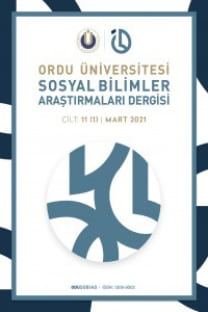Fen Eğitiminde Modelleme Temelinde Düzenlenen Kişiselleştirilmiş Harmanlanmış Öğrenme Ortamlarının Başarıya Etkisi
Fen eğitiminde, öğrencilerin bireysel öğrenmelerinden sorumlu oldukları
ve öğrenme sürecine aktif olarak katıldıkları stratejilere yer verilmelidir.
Öğrencilerin bireysel öğrenmelerini destekleyecek ortamların oluşturulması,
öğrenmenin bilişsel düzeyde anlamlı hale gelmesinde önemli rol oynayacaktır.
Özellikle soyut olguların ve kavramların öğretilmesinde, modellemeye dayalı
öğretimin kullanılmasıyla kavramsal öğrenme daha anlamlı hale
getirilebilecektir. Modellemeye dayalı öğretimin harmanlanmış öğrenme ortamlarıyla
birlikte kullanılmasıyla zaman ve mekân kısıtlamaları ortadan
kaldırılabilecektir. Bu çalışmanın
amacı, “Madde ve Isı” ünitesi için web destekli modelleme temelinde düzenlenmiş
kişiselleştirilmiş harmanlanmış öğrenme ortamlarının öğrencilerin başarısı
üzerindeki etkinliğini araştırmaktır. Araştırma, ortaokul 6. Sınıf (N=64)
öğrencileri ile yürütülmüştür. Bu çalışmada, nicel araştırma yöntemlerinden
yarı deneysel desen kullanılmıştır. Başarı seviyeleri denk olan iki sınıf,
rastgele olarak deney ve kontrol grubu şeklinde belirlenmiştir. Deney grubunda,
modelleme temelinde oluşturulan web destekli materyaller öğrenciler tarafından
kullanılmıştır. Kontrol grubunda ise kullanılmamıştır. Çalışmanın başında ve
sonunda öğrencilere ön test/son test şeklinde güvenirlik katsayısı (KR-20) .94
olan başarı testi uygulanmıştır. Çalışmanın verilerinin analizinden, deney
grubu öğrencileri lehine pozitif yönde anlamlı bir fark ortaya çıkmıştır. Bu
sonuçlardan, modelleme temelinde düzenlenmiş harmanlanmış öğrenme ortamlarının
öğrenci başarılarında olumlu bir etkisinin olduğu söylenebilir.
Araştırmacılara, kişiselleştirilmiş harmanlanmış öğrenme ortamlarında modelleme
temelinde etkinliklere yer vermeleri önerilmektedir.
Anahtar Kelimeler:
Fen eğitimi, web destekli öğretim, kişiselleştirilmiş harmanlanmış öğrenme, modelleme, assure, öğretim tasarım modeli
Effect of Personalized Blended Learning Environments Arranged on the Basis of Modeling to Achievement in Science Education
In science education, students should be responsible for their individual learning and strategies that they are actively involved in in the learning process. Establishing environments to support individual learning of learners will play an important role in making the learner's cognitive level meaningful. Conceptual learning can be made more meaningful by using modeling-based teaching, especially when abstract phenomena and concepts are taught. By using modeling-based instruction in conjunction with blended learning environments, time and space constraints can be eliminated. The purpose of this study is to investigate the effectiveness of the personalized blended learning environments, organized on the basis of web-based modeling for the "Matter and Heat" unit, on the success of the students. The study was conducted with 6th grade (N = 64) students in secondary school. In this study, semi-experimental research method was used as experimental research methods. The two classes of achievement levels were randomly assigned as experimental and control groups. In the experiment group, the web based materials and measurement tool created on the basis of the model were used by the students. Not used in the control group. At the beginning and at the end of the study, students were administered the achievement test with reliability coefficient (KR-20) .94 in the form of pre-test / post-test. From the analysis of the data of the study, a significant difference emerged in the positive direction in favor of the experimental group students. From these results, it can be said that the blended learning environments arranged on the basis of model have a positive effect on student achievement. Researchers are advised to include activities based on modeling in personalized blended learning environments.
Keywords:
Science education, web-based teaching, personalized blended learning, modelling, assure, Instructional design model,
___
- Dağ, F. (2011). Harmanlanmış (Karma) Öğrenme Ortamları ve Tasarımına İlişkin Öneriler, Ahi Evran Üniversitesi Eğitim Fakültesi Dergisi, 12(2), 73-97.
- Diep, A. N., Zhu, C., Struyven, K., and Blieck, Y. (2017). Who or what contributes to student satisfaction in different blended learning modalities?. British Journal of Educational Technology, 48(2), 473-489.
- Everett, S. A., Otto, C. A., and Luera, G. R. (2009). Preservice elementary teachers’ growth in knowledge of models in a science capstone course. International Journal of Science and Mathematics Education, 7(6), 1201-1225.
- Fisher, J. F., and White, J. (2017). Takeaways from the 2016 Blended and Personalized Learning Conference. The Education Digest, 82(6), 42.
- Göksu, İ., Özcan, K. V., Çakır, R., ve Göktaş, Y. (2014). Türkiye’de Öğretim Tasarımı Modelleriyle İlgili Yapılmış Çalışmalar. Ilkogretim Online, 13(2), 694‐709.
- ISSN: 1309-9302
- Yayın Aralığı: Yılda 3 Sayı
- Başlangıç: 2010
- Yayıncı: -
Sayıdaki Diğer Makaleler
Sevgi ELMAS ATAY, Merve GERÇEK
Kale-Kent Yapısıyla Iğdır Kalesi
Gökhan ÖZSOY, Emel BAYRAK ÖZMUTLU, Saniye Nur GÜNDÜZ
Sabahattin Ali Öykülerinde Marksist Söylem ve Kişilik Kurgusu
Vedi AŞKAROĞLU, Züleyha Hande AKATA
Orta Asya (Türkistan) Neolitik Çağ Ceytun Kültürü: Seramik Geleneği
Mahremiyet Eğitiminin Temeli İnsanlık Şerefi: Ailenin Mesuliyetleri
Cemal Süreya’nın “Üvercinka” Şiirinde Biçimsel Estetik Kaygı Ve Anlamsal Çok Boyutluluk
Beş Faktör Kişilik Özellikleri ve Cam Tavan Algısı Arasındaki Etkileşim
